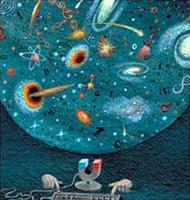| Wednesday, February 20, 2008 |
| Experiencing |
Buckminster Fuller, from "Critical Path": "A lot of people think or believe or know they feel (experience) -- but that's thinking or believing or knowing; not feeling (experiencing). Almost anybody can learn to think or believe or know, but not a single human being can be taught to feel (experience). Why? Because whenever you think or you believe or you know, you're a lot of other people: but the moment you feel (experience), you're nobody-but-yourself. To be nobody-but-yourself -- in a world which is doing its best, night and day, to make you everybody else -- means to fight the hardest battle which any human being can fight; and never stop fighting." [ Inspiration | 2008-02-20 15:38 | 1 comment | PermaLink ] More > |
| The universe as a virtual reality |
 Fun article by Linda Moulton Howe: "Could Our Universe Be A Virtual Reality Processed By Other Intelligence?" about a professor in Auckland who wrote a paper about that. That's not a new discussion, but it is always stimulating. In part because it makes us question a number of things about our existence. Which is a bit dangerous, of course. Quote by John Vacca from "The World’s 20 Greatest Unsolved Problems": Fun article by Linda Moulton Howe: "Could Our Universe Be A Virtual Reality Processed By Other Intelligence?" about a professor in Auckland who wrote a paper about that. That's not a new discussion, but it is always stimulating. In part because it makes us question a number of things about our existence. Which is a bit dangerous, of course. Quote by John Vacca from "The World’s 20 Greatest Unsolved Problems":“Quantum physicists who work with quantum theory every day don’t really know quite what to make of it. They fill blackboards with quantum calculations and acknowledge that it is probably the most powerful, accurate and predictive scientific theory ever developed, but the very suggestion that it might be literally true as a description of Nature is still greeted with cynicism, incomprehension and even anger.”Theoretical scientists can propose outrageous theories about how the universe works, but you easily get in a bit of trouble if you propose that it might have something to do with our everyday existence. Anyway, Professor Whitworth there has worked for years on finding analogies in the computer world for how the world works, and he also has some interesting answers for how certain qualities of the physics we discover seem to back up the idea that the universe is a simulation. Whis is the subject of the interview in the article. So, how would, for example, the limited speed of light indicate that the universe is a simulation? There is a fixed amount of processing available, let’s say, in space. So, if an object is being passed from point to point in space, there’s only a certain amount of processing available to each point in space, OK? And if that processing is involved in the calculation of movement, that changes the processing. The smaller and smaller amount that is left makes the mass seem greater and greater.Or, expressed in a computer screen refresh metaphor: Your screen has a certain rate with which it refreshes, which depends upon the little points that make up the screen. And each of these points can only flash on and off at a certain rate. So when a pixel moves across the screen, what it means is that it starts off and one point flashes. Then that point turns off and the next point flashes and so on. So, the rate of movement depends on the rate of flashing of the screen. It’s the refresh rate and it might be 70 megahertz; it might be 80 megahertz ... But whatever it is, it doesn’t matter. That’s going to mean that a dot can move across your screen so fast and no faster.So, the speed of light is just the screen refresh rate, that is fun. What about the Big Bang? The Big Bang is when the simulation was started, when the virtual processing began...And here's an angle I like: Now, if the physical world is a virtual reality that does not necessarily imply that our consciousness is in the virtual reality. It could be exactly the same as your playing an avatar in a game. It’s conceivable that while everything you see and hear is definitely part of the pixels – or certainly, part of the virtual reality – it’s possible that you are not looking from inside the virtual reality.Actually, if we imagine that the universe is a simulation, it makes it all the more unlikely that the consciousness which is you is fully generated by the simulation. There'd be no point to Second Life it you couldn't, from the outside, step into it and experience the simulation. You can change your hairstyle, or your body style, and you can redecorate your house, but if there's nobody there, there's just no point. Same thing with a universe. The postulate is that the physical universe – if indeed it is a virtual reality – cannot create itself out of itself. It’s just not possible. So, there must be Something outside of it. Therefore, quantum mechanics is describing that Something. The equations of quantum mechanics, which are quite different from our concepts of physical reality, are describing this Something. The idea is that what we are seeing as we walk around is just an interface which is calculated at the moment when we look, sort of an on-demand thing.Now we're talking. Of course, even if we conclude that the universe is a virtual reality, it doesn't necessarily mean it is running inside some huge computer. It means there's processing going on, but what medium it exists in, that's another matter. [ Knowledge | 2008-02-20 16:39 | 6 comments | PermaLink ] More > |